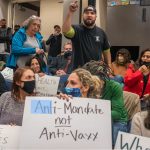“As a former school board member – and as a researcher who studies educational leadership and policy – I find it worrisome when polarizing issues generate so much attention from candidates,” says Casey Cobb, Neag Professor of Educational Policy at the Neag School of Education. “The reason I worry is that I know from firsthand experience that being an effective school board member is never just about taking a stance on a few hot-button topics. Rather, it’s about much broader issues, such as meeting the educational needs of all students in the school district.”
“As a former school board member – and as a researcher who studies educational leadership and policy – I find it worrisome when polarizing issues generate so much attention from candidates,” says Casey Cobb, Neag Professor of Educational Policy at the Neag School of Education. “The reason I worry is that I know from firsthand experience that being an effective school board member is never just about taking a stance on a few hot-button topics. Rather, it’s about much broader issues, such as meeting the educational needs of all students in the school district.”
This past month, UConn alumni, staff, and students gathered virtually for the #ThisIsAmerica: Critical Race Theory in Schools panel. #ThisIsAmerica, organized by the UConn Foundation with co-sponsors from across the University, is a series that brings together the UConn community to discuss and unpack systematic racism, social justice, and human rights issues. In addition, it spotlights the individuals, organizations, and movements fighting for justice and equity, and against oppression and white supremacy.
With a General Election just around the corner, the so-called “sleepy” town of Guilford has made national headlines, gripped by a polarizing debate over what’s being taught in schools. Guilford High School English Chair George Cooksey and Superintendent Paul Freeman explain that while critical race theory is not itself taught in the K-12 environment in Guilford, “dimension” and diversity of source material is still a priority. Plus, a new Black and Latino Studies elective is rolling out in Connecticut high schools next fall, following the first mandate of its kind in the country. A Windsor High School teacher and student who are piloting the course weigh in.
With a General Election just around the corner, the so-called “sleepy” town of Guilford has made national headlines, gripped by a polarizing debate over what’s being taught in schools.
Guilford High School English Chair George Cooksey and Superintendent Paul Freeman explain that while critical race theory is not itself taught in the K-12 environment in Guilford, “dimension” and diversity of source material is still a priority. Neag School’s Saran Stewart also served as a panelist, along with Freeman and others.


